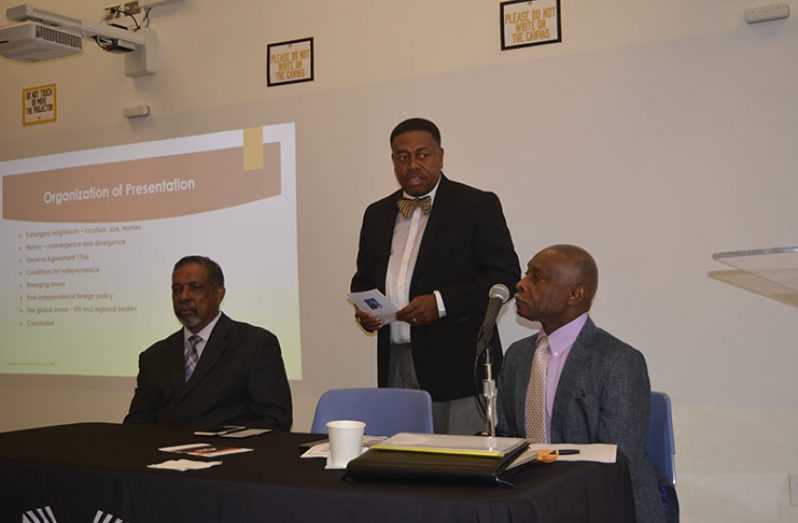–sells Guyana as ‘the next big oil producer in the Western Hemisphere’
By Svetlana Marshall in New York
GUYANA-born Professor Dean Terrence Blackman was on Monday hailed as “a visionary” for inviting Guyana’s Minister of Foreign Affairs, Mr Carl Greenidge, to the Medgar Evers College (MEC) to speak on the subject, ‘The Promise of Oil.’
“What he has done in inviting the vice-president to come here and speak to this community is of no small significance,” said MEC’s Director of the International Affairs Centre, Professor Eugene Pursoo.
“Today, whatever goes on here will be a part of the history of Medgar Evers College,” he said, as he applauded Dr Blackman for taking such a bold and critical step.
Dr Blackman is the Dean of the School of Science, Health and Technology at Medgar Evers College, City University of New York (CUNY) in Brooklyn.
Though the forum was intended to address the promise of oil and its potential impact on Guyana’s developmental trajectory, it also created a platform for wide-ranging discussions on various topics, from the Guyana-Venezuela border controversy to collaboration in the field of education and the Draft Diaspora Engagement Strategy and Action Plan.
Monday’s forum was inaugurated as a new offering from the School of Science Health and Technology, ‘Conversations with Dean Blackman.’
Dr Blackman explained that his ‘conversations’ are intended to connect the college to issues of profound importance to the City of New York, the State of New York, the USA, and by extension the wider world.
“Our goal is to learn how our speakers are leveraging science, technology, global strategy and policy to connect young people to opportunities,” he explained.

He said it was on the basis of the significant developments unfolding here in Guyana that Minister Greenidge was asked to make a presentation.
“As many of you might be aware, Guyana is poised to become the next big oil producer in the Western Hemisphere, Dr Blackman said.
“The country is attracting the attention and investment dollars of some of the biggest oil companies in the world. Experts now estimate that one of its offshore fields alone, known as Liza, could contain 1.4 billion barrels of oil, mixed with natural gas, comparable to some of the larger fields drilled in South America,” he told his MEC colleagues.
He also used the opportunity to thank Minister Greenidge and the Government of Guyana for responding to his call.
Minister Greenidge, in addition to making an extensive presentation on the Guyana-Venezuela border issue, said petroleum, like all commodities which bring tremendous wealth, could also bring with it the potential for undermining public ethics.
“It is also true that for most of our citizens, they long for better standards of living, financial opportunities, economic opportunities and a social framework that allow them to fulfil their potential as individuals,” Minister Greenidge said.
“And therefore, the job of a policy-maker is to try and strike a balance; not strike a balance between corruption and these things, but strike a balance between development and the other challenges,” he told the room-full of students, professors and deans.
He said that although Guyana has sought to capitalise on timber, sugar, bauxite and gold among other resources, many of its people did not benefit significantly from the proceeds in the past. “One of the challenges that a government has, is to make sure that it manages its business, so that its people and their aspirations can be fulfilled, and that is really the challenge,” Minister Greenidge posited.
During the course of the evening, discussions were also held on an exchange education programme among schools and universities in Guyana and Medgar Evers.
Medgar Evers College is party to a Statement of Shared Interests with the University of Guyana. The two tertiary institutions have agreed, in writing, to explore ways in which they may be able to promote and develop academic cooperation within mutually acceptable fields.











